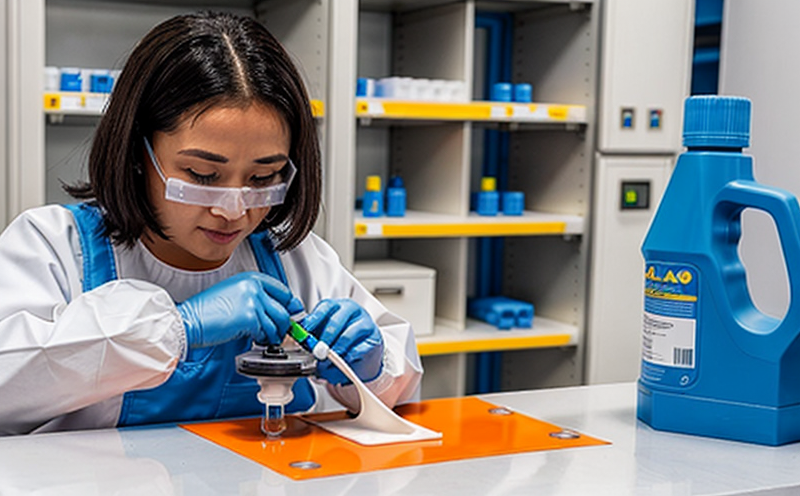DIN EN ISO 7390 Sag Resistance of Sealants Containing Nano Additives
The DIN EN ISO 7390 sag resistance test is a critical procedure in the quality assurance process for sealants, especially those containing nano additives. This test evaluates the ability of these materials to resist deformation under their own weight over time. The presence of nano additives can significantly influence the physical properties and performance characteristics of sealants. Therefore, ensuring compliance with international standards like DIN EN ISO 7390 is essential for manufacturers.
The sag resistance test involves applying a specified load on a sample of the sealant to simulate real-world conditions where adhesives or sealants are subjected to gravity over time. This helps in assessing the material's stability and long-term durability. The nano additives within these sealants can enhance various properties such as elasticity, strength, and resistance to aging. However, their effect on sag resistance is not always straightforward and requires precise testing.
During this test, samples are prepared by applying a layer of the sealant onto a flat surface under controlled conditions. The sample is then subjected to a specified load, typically ranging from 50 N/m² up to 150 N/m² depending on the standard and the specific application. The sample is left under these conditions for a defined period—often between 24 hours and 7 days—depending on the intended use of the sealant.
The sag resistance test provides valuable insights into how nano additives affect the material's performance in terms of maintaining its shape and integrity over time. This information is crucial for quality assurance, especially when dealing with high-performance materials used in critical applications such as aerospace, automotive, and construction sectors.
Understanding the impact of nano additives on sag resistance can help manufacturers optimize their formulations to meet both performance requirements and regulatory standards. By adhering to international standards like DIN EN ISO 7390, they ensure that their products are reliable and safe for use in diverse environments.
- Environmental Impact: Proper testing ensures that sealants do not degrade prematurely, reducing the need for frequent replacement. This minimizes waste and supports sustainable practices.
- Safety Considerations: Ensuring sag resistance helps prevent potential failures in critical applications, enhancing safety and reliability.
- Economic Benefits: Reliable sealants contribute to longer-lasting structures, reducing maintenance costs over the long term.
Why It Matters
The significance of the sag resistance test cannot be overstated in the context of nano additives within sealants. Proper testing ensures that these materials meet stringent quality and performance standards, which is paramount for industries relying on high-quality adhesives and sealants.
For instance, in the aerospace industry, where reliability and safety are non-negotiable, ensuring that sealants do not sag or deform under their own weight over time can prevent catastrophic failures. In the automotive sector, this test ensures that seals maintain their integrity during rigorous testing conditions, including temperature changes and exposure to environmental factors.
The construction industry also benefits significantly from reliable sag resistance testing. Properly formulated sealants contribute to the longevity of buildings and infrastructure by resisting deformation due to gravity over time. This reduces maintenance costs and extends the life cycle of structures.
Moreover, compliance with international standards like DIN EN ISO 7390 not only ensures product quality but also supports global trade by aligning local practices with internationally recognized benchmarks. This is particularly important for companies operating across multiple regions or exporting their products to different countries.
The test results provide critical data that can guide manufacturers in optimizing their formulations, ensuring that nano additives are used efficiently and effectively without compromising on the material's performance characteristics.
Eurolab Advantages
Eurolab offers a comprehensive suite of services to support clients in meeting the stringent requirements of DIN EN ISO 7390 and other relevant standards. Our team of experts brings extensive experience in materials testing, ensuring that our clients receive accurate, reliable results.
Our state-of-the-art facilities are equipped with advanced instrumentation capable of conducting precise sag resistance tests according to international guidelines. This allows us to provide accurate data on the performance of nano additives within sealants under controlled conditions.
We offer a range of services tailored to meet the specific needs of our clients, from initial consultation and sample preparation to detailed reporting and analysis. Our approach ensures that every step of the testing process is conducted with utmost precision, ensuring confidence in the results.
Moreover, Eurolab's commitment to quality extends beyond just testing. We offer training sessions and workshops for professionals seeking to understand the intricacies of nano additives within sealants. This support helps our clients stay ahead in their respective industries by providing them with up-to-date knowledge and best practices.





